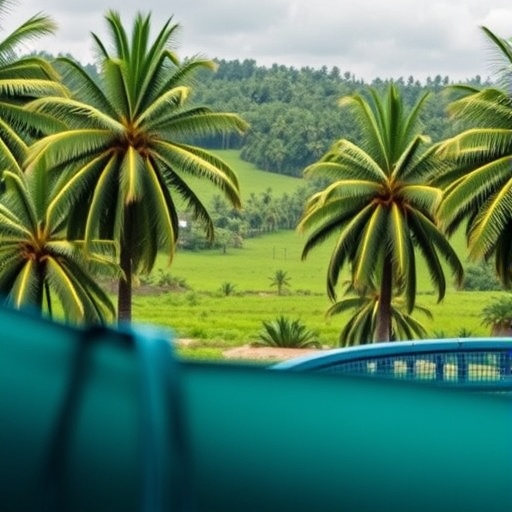The palm oil industry has become a focal point of environmental discourse, especially with its significant implications for biodiversity and sustainability. A recent study conducted by Rosmeika and colleagues investigates the environmental impact of palm cooking oil in Sumatra, Indonesia, a region that has been at the heart of palm oil cultivation. This research scrutinizes the ecological repercussions of palm oil production, drawing attention to the necessary balance between economic development and environmental conservation.
Indonesia is a global leader in palm oil production, with vast monoculture plantations sprawling across its landscape. This cultivation has been associated with considerable deforestation, particularly in biodiverse regions like Sumatra. The study emphasizes how the expansion of palm oil plantations contributes to habitat loss for endangered species, such as the Sumatran orangutan and the Sumatran tiger. These majestic creatures, iconic symbols of Indonesia’s wildlife, face an increasingly precarious situation as their habitats are obliterated for agricultural use.
The analysis highlights the role of palm plantations in greenhouse gas emissions, which is a pressing concern in the context of climate change. The researchers detail how the drainage of peatlands for palm oil cultivation releases significant amounts of carbon dioxide into the atmosphere. This release exacerbates the global warming crisis and directly contradicts Indonesia’s commitments to reducing carbon emissions. The findings suggest that regulatory frameworks must be rigorously enforced to mitigate such environmental damage.
Critical to understanding this complex issue is the socio-economic context of palm oil production. The research showcases how palm oil is intertwined with the livelihoods of millions of Indonesians. It is a major source of income and employment, particularly in rural communities. However, the study insists that economic benefits must not come at the expense of ecological integrity. The researchers advocate for sustainable agricultural practices that can support both the economy and the environment.
Furthermore, Rosmeika et al. delve into the risk of soil degradation connected to intensive palm oil farming. Continuous monoculture leads to nutrient depletion and increased susceptibility to pests and diseases, which can further drive farmers to use chemical fertilizers and pesticides. This creates a detrimental cycle where soil health is compromised, leading to reduced agricultural productivity over time. Sustainable soil management practices are recommended to counteract these effects and promote long-term viability of palm oil products.
The research also explores the impacts on water resources. The high water demand for palm oil cultivation can lead to depletion of local water sources, proving detrimental to both agriculture and local communities. Water scarcity can hinder food production and affect human health, calling for urgent interventions in water management strategies in palm oil-producing regions.
Another significant area of concern is the socio-political landscape surrounding palm oil production. Land rights issues often arise as local communities confront large-scale plantation expansions. The study documents instances where indigenous rights are undermined, leading to conflicts that challenge the stability of rural communities. It emphasizes the need for inclusive policies that protect local land rights while promoting sustainable practices within the agricultural sector.
As the global demand for palm oil continues to rise, driven by food, cosmetics, and biofuels, this research underscores the critical need for certification schemes that endorse sustainable palm oil production. Certification can serve as a mechanism for consumers to make informed choices that support environmentally and socially responsible practices. The study argues for a collective effort among governments, industries, and consumers to prioritize sustainable palm oil in the global marketplace.
The implications of this research extend beyond Indonesia, affecting global supply chains and consumer behavior. An informed public can drive demand for sustainably produced palm oil, which in turn may influence producers to adopt eco-friendlier practices. Increased awareness and education surrounding the impacts of palm oil are paramount in fostering a more sustainable future.
Importantly, the findings presented in this research align with international sustainability goals, particularly those outlined in the United Nations Sustainable Development Goals (SDGs). The transition towards sustainable palm oil production is intimately connected with impoverished communities and their quest for better livelihoods, making it imperative to reassess practices in favor of sustainability.
In conclusion, the meticulous analysis provided by Rosmeika et al. sheds light on the multifaceted environmental impacts of palm cooking oil production in Sumatra. The juxtaposition of economic aspirations with environmental stewardship represents a critical challenge that requires immediate attention. Policymakers, researchers, and consumers must unite to enact change that ensures the preservation of Indonesia’s rich biodiversity, supports local communities, and curtails the devastating effects of climate change.
The authors’ research calls for a reevaluation of current practices and policies surrounding palm oil production, highlighting the urgent need for sustainable methodologies that balance ecological interests with economic growth. Only through a rigorous commitment to sustainable development can we hope to protect the rich ecosystems of Sumatra and secure a healthier environment for future generations.
Subject of Research: Environmental impact of palm cooking oil production in Sumatra, Indonesia
Article Title: Environmental impact of palm cooking oil: a case study in Sumatra, Indonesia
Article References:
Rosmeika, R., Febijanto, I., Soraya, D.F. et al. Environmental impact of palm cooking oil: a case study in Sumatra, Indonesia.Environ Sci Pollut Res (2025). https://doi.org/10.1007/s11356-025-37056-1
Image Credits: AI Generated
DOI: 10.1007/s11356-025-37056-1
Keywords: palm oil, environmental impact, Sumatra, sustainability, biodiversity, climate change, deforestation, economic development, soil degradation, water resources, land rights, certification, UN Sustainable Development Goals.




